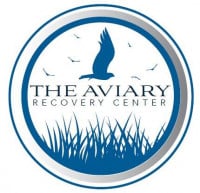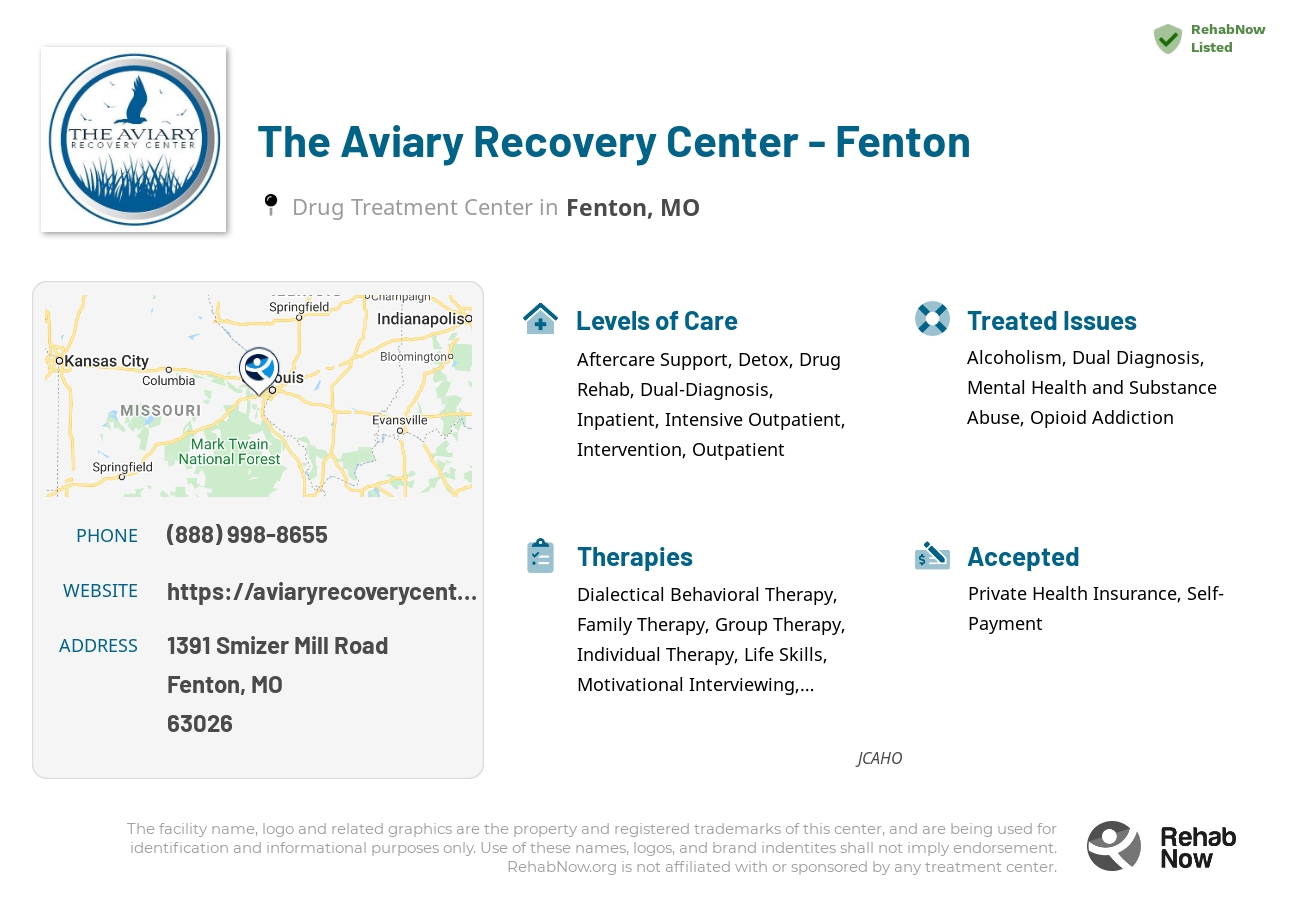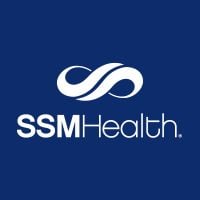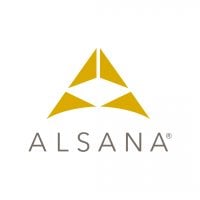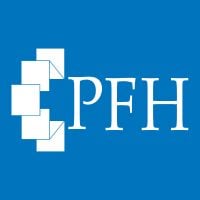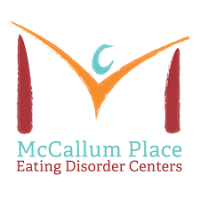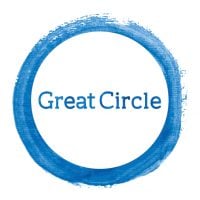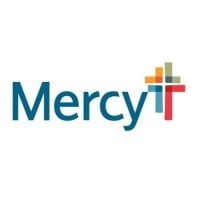The Aviary Recovery Center - Fenton
Drug Rehab Center in Fenton, Missouri
The Aviary Recovery Center - Fenton offers comprehensive addiction and substance abuse recovery programs, including inpatient and outpatient care, medication-assisted detox, and evidence-based therapies, with a multidisciplinary team, individualized treatment plans, and aftercare support, as well as unique features like an on-site gym, a music studio, and an art room, and holistic treatment options like yoga, meditation, and nutrition education.
About This Missouri Facility
The Aviary Recovery Center - Fenton is an addiction and substance abuse recovery center located in Fenton, Missouri. Founded in 2019, they offer comprehensive inpatient and outpatient care, as well as medication-assisted detox programs. Their programs emphasize evidence-based therapies and holistic healing approaches to help patients achieve lasting recovery. Their staff includes a multidisciplinary team of psychiatrists, counselors, and medical staff. They also provide extensive aftercare support for individuals.
The Aviary Recovery Center - Fenton offers a range of specialized services for patients dealing with addiction and substance abuse. These services include individual counseling, group therapy, life skills education, medicated-assisted therapy, and lifestyle coaching. They also provide support for co-occurring mental health issues, such as depression and anxiety, and create individualized treatment plans to meet the needs of each patient. Additionally, they offer family programs to help family members better understand addiction and work together to help patients achieve long-term recovery.
The Aviary Recovery Center - Fenton is a Joint Commission-accredited and Missouri Division of Behavioral Health-licensed treatment center. In addition to their accreditations and licensure, they offer unique features, such as an on-site gym, a music studio, and an art room. They also provide a range of holistic treatment methods such as yoga, meditation, and nutrition education. The Aviary Recovery Center - Fenton is committed to helping individuals and families find hope and healing.
Genders
Ages
Modality
Additional
Accreditations

LegitScript

JCAHO
Conditions and Issues Treated
Opioid addiction is the result of repeated use, or abuse, of opioid drugs. It is recommended for people who are dependent on opioids, or who have a high risk for dangerous health concerns, to seek professional treatment. Treatment plans usually include behavioral therapy and medication-assisted treatment.
Opioid drugs include: fentanyl, heroin, methadone, oxycodone, and oxymorphone.
Opioid addiction treatment is beneficial for:
- People who have a history of severe withdrawal.
- People with a high risk for dangerous health concerns.
- People having difficulty overcoming opioid addiction on their own.
There are different kinds of Dual Diagnosis:. A person who simultaneously experiences both a mental illness and an addiction disorder. Or, a person who experiences one or more coexisting (simultaneous) mental health conditions in addition to a primary substance use disorder.
The treatment requires a multi-disciplinary approach, it’s crucial for individuals to partner up with a healthcare provider who understands all the recovery components.
Levels of Care Offered at The Aviary Recovery Center - Fenton
This center offers a variety of custom treatment tailored to individual recovery. Currently available are Aftercare Support, Detox, Drug Rehab, Dual-Diagnosis, Inpatient, Intensive Outpatient, Intervention, Outpatient, with additional therapies available as listed below.
Detox is the stage of recovery where the drugs or alcohol are entirely removed from your body. There are two different ways to detox, with medications and without. For many drugs and alcohol, the acute phase of detox can be completed in a number of days.
Inpatient treatment is the most intensive level of care, and it’s necessary for those who aren’t able to control their addiction. These patients also must be drug-free before attending inpatient programs .
During inpatient treatment, addicts live at an inpatient facility 24 hours a day while receiving help. This type of program is generally recommended for those who need to go through detoxification or who are struggling with serious addiction-related issues.
An Intensive Outpatient Program (IOP) is a form of drug treatment that allows individuals to receive the therapy they need while remaining in their homes and community.
An IOP is typically 3-5 days per week, at least 4 hours each day of treatment. Treatment can last for a few months or longer, depending on the situation.
An IOP is a step down from an inpatient treatment center and can be used as a step down from an inpatient stay or as a more intense form of outpatient treatment. IOPs allow for the flexibility to continue working and living at home while still meeting treatment demands.
The outpatient programs in Fenton, MO are for those addicted drugs or alcohol. The goal of the outpatient rehabilitation program is to make them stop abusing drugs or alcohol, reduce drug use or addictive behaviors, and become entirely sober. It is generally required to attend the outpatient program for 10-12 hours every week.
Patients can be administered on-the-spot medication to ease withdrawal symptoms such as anxiety, increased heart rate, and even depression. Groups such as Alcoholics Anonymous (AA) and Narcotics Anonymous (NA) can be used as a part of outpatient treatment to help maintain sobriety.
The main goal of an intervention is for the addict to go to rehabilitation and address their addiction.
Interventions are meetings organized by friends and family of an individual with addiction. A specialist is present to lead the discussion and motivate the addict to seek external support. Intervention services help family members to open up about their feelings and concern for the addict. This expressiveness usually results in the addict seeking treatment at a rehabilitation facility.
Aftercare support is a service many addicts need to ensure their success at recovery. This service usually includes one-on-one or group therapies, assistance from a sponsor and other types of help designed to make sure the patient continues living a life free from drugs.
Patients also may require medication to help them battle addiction. Some people have been able to successfully recover without additional medications, but others have found that they need help during their transition. Long-term, the patient must take the initiative to attend meetings and receive help from other addicts in recovery.
Therapies & Programs
People in addiction recovery can benefit from individual therapy. This type of therapy involves meeting with a therapist one-on-one. This allows for a personal and trusting relationship to be built so that the patient can be truly themselves and express any emotions they feel. Individual therapy leads to greater understanding and peace about your triggers for addiction and coping strategies to prevent relapse.
Family therapy is a type of group problem-solving that aims to improve communication and relationships between the patient, their family, and sometimes friends. The main goal of family therapy for drug addiction is to create an environment where communication can occur without judgment, hostility, or blame. The therapist is with the family as they learn to communicate with each other differently, especially with the addict when s/he is using.
Group therapy sessions are held in rehab facilities, clinics, churches or community centers that offer drug addiction treatment. People who attend these groups are encouraged to voice their feelings and support other addicts in recovery. This helps group members strengthen their own recovery program while cheering on others who are struggling with sobriety.
Group therapy sessions provide recovering addicts with a chance to cope with everyday situations that many face. Group therapy sessions are held in rehab facilities, clinics, churches or community centers that offer drug addiction treatment.
People who attend these groups are encouraged to voice their feelings and support other addicts in recovery. This helps group members strengthen their own recovery program while cheering on others who are struggling with sobriety.
If you’re looking for addiction treatment, it’s important to find a facility that offers trauma therapy. This type of therapy helps people process and understand the past traumas that have led to their addiction. Trauma therapists will work with clients to help them understand their past and present relationships and show them that they are worthy of love. This therapy is typically done using visualization, discussion, and writing down thoughts and feelings.
Trauma Therapy is a form of therapy that involves working with a patient to help them process and understand the past trauma(s) in their life. This therapy is typically done using techniques such as visualization, discussion, and writing down thoughts and feelings. The main goals of trauma therapy is to help clients express their emotions and talk about what they are feeling.
Dialectical Behavior Therapy (DBT) is a form of cognitive-behavioral therapy that helps people understand how they connect their thoughts, behaviors, and feelings. It can give them more control over their actions, effectively stopping self-harm ideations and attempts in some patients. It also helps put those with borderline personality disorder into control for managing mental struggles.
A new study has shown that DBT works for those with self-harm behaviors and addictions by giving them therapy they can relate to and understand.
Cognitive Behavioral Therapy (CBT) helps addicts identify faulty, negative thinking so that they can work together with the therapist to find healthier ways of thinking. CBT focuses on specific aspects of each person’s thinking, feeling, physiology, and behavior. It aims to identify specific problems in these areas, and create a personalized treatment strategy.
Life Skills Services offered at The Aviary Recovery Center - Fenton assists addicts in their recovery by teaching them healthy coping mechanisms that will aid them in becoming sober, focussing on helping people enter into, and maintaining long-term sobriety. The Aviary Recovery Center - Fenton provide Life Skills Services at varying levels of intensity, specific to the needs and requirements of each patient.
Benefits of Life Skills Services offered at Drug Treatment Centers in Missouri:
- Restores hope and empowerment — Helps addicts believe that recovery is possible and instills a new confidence in their ability to achieve a positive, drug-free future
- Enhances family involvement — Encourages families to get involved in the recovery process and supports their understanding and encouragement of healthy behavior.
- Increases patient’s compliance — Helps patients take responsibility for and ownership of their recovery and encourages continued progress
- Reduces relapse rates — Encourages long-term abstinence and emphasizes the importance of establishing sober support systems.
12-Step Program is used by drug treatment centers to get addicts sober. The treatment is outlined by Alcoholics Anonymous and Narcotics Anonymous books which detail the steps drug users need to take in order to get sober. The program is often used as a part of an inpatient or outpatient treatment program and is frequently recommended by doctors.
The 12 steps typically begin with addicts admitting they need help. They are then guided through the steps by a sponsor, someone who has already struggled to get sober themselves. They will work through physical withdrawal symptoms, identify the problems that led to their addiction and learn how to resist cravings.
Payment Options Accepted
For specific insurance or payment methods please contact us.
Is your insurance accepted?
Ask an expert, call (888) 674-0062
The Aviary Recovery Center Associated Centers
Discover treatment facilities under the same provider.
Learn More About The Aviary Recovery Center Centers
Additional Details
Specifics, location, and helpful extra information.
Fenton, Missouri 63026 Phone Number(888) 998-8655 Meta DetailsUpdated November 25, 2023
Staff Verified
Is The Aviary Recovery Center – Fenton a LegitScript Verified Treatment Facility?
According to our most recent records, we have found this center to be LegitScript verified.
Patient Reviews
There are no reviews yet. Be the first one to write one.
Fenton, Missouri Addiction Information
Opioid-related overdoses in Missouri have been increasing steadily for the past three decades. In 2018, more than 1,130 people in Missouri died from opioid abuse. Methamphetamines and marijuana abuse have surpassed opioid abuse in Missouri. Missouri is the number 1 methamphetamine manufacturer in the country with more than 27 meth labs per 100,000 people.
The drug addiction issue in Fenton, Missouri, is serious. According to the National Institute on Drug Abuse, in 2016, about 11.8% of Fenton residents reported past-year drug use. The most commonly reported substance abuse problems among Fenton adults were alcohol, marijuana, and methamphetamine. The drug treatment process in Fenton depends on the facility. However, most drug rehab programs will begin with a detoxification process to rid your body of drugs or alcohol.
Treatment in Nearby Cities
- Owensville, MO (56.9 mi.)
- Odessa, MO (190.3 mi.)
- Gainesville, MO (170.6 mi.)
- Harrisonville, MO (209.5 mi.)
- Nixa, MO (184.9 mi.)
Centers near The Aviary Recovery Center - Fenton
The facility name, logo and brand are the property and registered trademarks of The Aviary Recovery Center - Fenton, and are being used for identification and informational purposes only. Use of these names, logos and brands shall not imply endorsement. RehabNow.org is not affiliated with or sponsored by The Aviary Recovery Center - Fenton.
